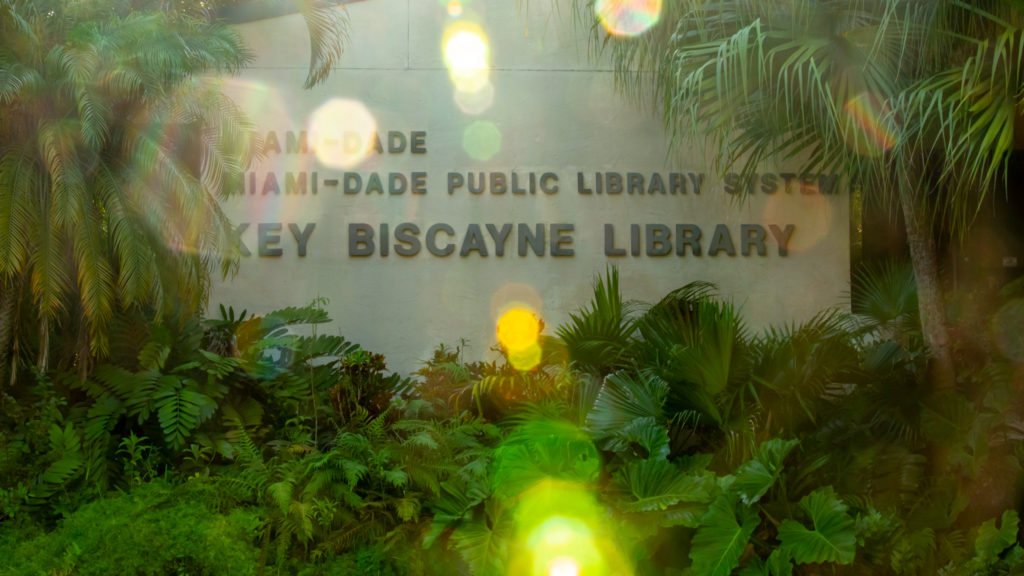County Files Suit Over Key Biscayne Library
Tony WintonSeptember 16, 2019

The exterior of the Key Biscayne library branch, Sept. 15, 2019. Miami-Dade County has filed suit asking for a free hand in making changes so the facility can be expanded, but neighboring condominium residents have expressed traffic and other concerns. Manager Andrea Agha has budgeted a $1.1 million expansion in partnership with the County (Key News/Tony Winton)
Miami-Dade County is asking a judge to clear the way for a planned $1.1 million expansion of Key Biscayne library, but the president of the adjoining Key Colony condominium complex said owners were not consulted and that lawyers are reviewing the case for possible legal action.
The future of the library has occupied Village Council debates for years. While there has been continued support for a modernization of the facility, Key Colony residents say they fear increased traffic and have aesthetic issues for the 40-year-old library and park along Crandon Boulevard, where waterfowl congregate next to a small pond.
Manager Andrea Agha’s 2020 budget, given preliminary approval Tuesday, includes $100,000 for conceptual planning. It foresees $1.1 million expenditure in 2021 for a partnership with the County for an expansion on the current site.
“We have authorized legal counsel to look into this,” said Key Colony Homeowners’ Association President Antonio Camejo.
In December, Council Member Katie Petros asked the council to fast track the library project on the current site, including options for a two-story structure, flex space, and cafe. The council asked the Village attorney to get a legal opinion letter on whether an expansion to a second floor was possible before proceeding further.
Word of the County’s decision to file the lawsuit and the capital plan caught some by surprise.
“It’s news to me,” said Luis de la Cruz, the head of the 2040 Vision committee whose panel is reviewing community wide improvements, including the library.
Over the years, proposals have included taking over operation of the library from the County and relocating it to another spot, or building a much larger, multistory library and multipurpose community center on the existing site, a proposal condominium leaders have sharply criticized in the past.
It’s unclear who authorized the County attorney to file a lawsuit, and the Aug. 12 filing does not provide any detail of kinds of changes officials envision for the building.
County Mayor Carlos Gimenez’ 2020 budget includes an $8.2 million unfunded line item for a total rebuild of the Key Biscayne branch, one of dozens of $85 million in library capital projects that currently have no funding.
In prior years, the Village had been negotiating with the Library system for an upgrade, but in January 2018, Vice Mayor Frank Caplan said the current location was “not the optimal site because we are space-limited.” He told fellow council members that the Village entry block would be a better site, but discussions to purchase that property have stalled over price.
Village residents pay a separate County tax for the library system, expected to generate $2.4 million from Key Biscayne property owners next year, according to data from the property appraiser’s office. One option suggested by former Council Member Gary Gross would have involved ‘opting out’ of the County system and using the tax revenue for a Village-run library facility that could address a number of community needs.
But the lawsuit and Agha’s budget memo indicate the expansion of the current site is back on track, although details remain unknown.
“The County and Key Biscayne desire to renovate and expand the current library in order to meet the needs of the residents of Key Biscayne,” the suit says.
Miami-Dade Commissioner Xavier Suarez, who represents Key Biscayne, said he was unaware of the lawsuit. He said his said staff is looking into it.
Myriam Marquez, a spokeswoman for Mayor Carlos Gimenez, sought to deflect questions about the lawsuit by noting the County Commission directs the County attorney, although the library system falls under the authority of the mayor.
The current Key Biscayne library was once the sales office for the 1,179-unit Key Colony complex in the late 1970s. In a 1979 deal with the County, developer Fritz Scharenberg deeded the buildings and the land for a library, with the condition the parcel could only be used for a library. Moreover, the deed specifies that changes must be approved by an architectural panel jointly chosen by the County and the developer’s company, Fininvest Ltd.
“The basic appearance of the existing improvements on the property shall remain and not be modified,” the deed says.
The County is asking the court that it no longer be bound the architectural restriction.
The lawsuit, known as a declaratory judgment action, claims the County has been unable to contact any representative of Fininvest, which it says no longer exists as a corporation. Scharenberg died in 2012.
It therefore is asking a judge to declare that the architectural restriction be removed. Under state law, a court can be asked to modify a deed restriction if it is “impossible” to fulfill its terms, Spencer wrote.
It is unclear what legal rights Key Colony may have, if any. Some residents have argued that the sales literature for the complex advised potential purchasers that the library would remain a permanent feature of the neighborhood.


